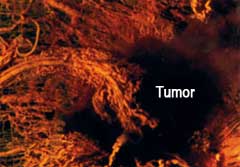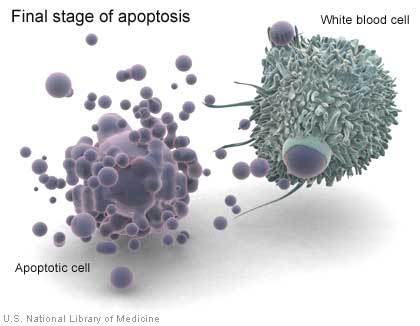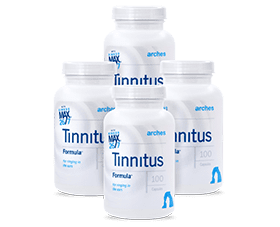Editor’s Note: The many health benefits of Ginkgo biloba have been documented in a previous article. These include anti-oxidant activity, prevention of atherosclerosis, increased absorption of oxygen and glucose in the brain and others. Ginkgo biloba extract is one of the primary ingredients in Arches Tinnitus Formula®.
By Barry Keate
Barry Keate, has lived with tinnitus over 40 years and has published 150+ research articles on numerous aspects of tinnitus. He is an expert on the condition and a well-known advocate for those with tinnitus.
The focus of Quiet Times will always be tinnitus and its treatments, but every once in a while, a subject comes up that is so compelling and exciting that we elect to broaden our scope a little. Now is one of those times.
For discussion purposes, all references to ginkgo or Ginkgo biloba indicateGinkgo biloba extract. There is now a large and growing body of evidence that Ginkgo biloba has powerful anti-cancer properties. The primary mechanisms of action through which these properties work are:
1 – Powerful anti-angiogenesis effect,
2 – Promotes cancer cell apoptosis,
3 – Anti-inflammatory properties,
4 – Anti-oxidant properties,
5 – Stabilization of DNA mutations.
Before we proceed some definitions of terms are necessary.
Angiogenesis is the process of new blood vessel growth from existing blood vessels. This is a normal process in growth and development as well as in wound healing. However, this is also a fundamental step in the transition of tumors from a dormant state to a malignant state.
 A tumor consists of a population of rapidly growing and dividing cancer cells. Tumors will not grow larger than 1-2 mm (approximately 1/16”) if deprived of oxygen and other essential nutrients. If left at this stage, cancer cells will deteriorate and die, causing no damage to the body. At this point cancerous tumors induce blood vessel growth (angiogenesis) by secreting various growth factors, which cause capillary growth into the tumor. With this new blood supply the tumor can grow exponentially and can also metastasize through the capillaries and vessels to other areas of the body. (Note: The above picture shows capillaries feeding a tumor.)
A tumor consists of a population of rapidly growing and dividing cancer cells. Tumors will not grow larger than 1-2 mm (approximately 1/16”) if deprived of oxygen and other essential nutrients. If left at this stage, cancer cells will deteriorate and die, causing no damage to the body. At this point cancerous tumors induce blood vessel growth (angiogenesis) by secreting various growth factors, which cause capillary growth into the tumor. With this new blood supply the tumor can grow exponentially and can also metastasize through the capillaries and vessels to other areas of the body. (Note: The above picture shows capillaries feeding a tumor.)
I recently watched this process on the PBS series, Nova Now. Scientists showed the lens of a mouse eye, where blood vessels do not exist. They implanted a small tumor in the lens. Over the next couple of days, blood vessels were seen growing toward the tumor. When the tumor was removed, these blood vessels shriveled. It was a dramatic demonstration of angiogenesis that graphically demonstrated how tumors hijack normal body functions for their own use.
Efforts to control or eliminate angiogenesis in tumor growth have become one of the most promising and exciting areas in cancer therapy. If tumor angiogenesis can be stopped, tumors will wither and die. Ginkgo biloba has powerful anti-angiogenic properties that we will see in the following clinical studies.
Apoptosis is the process of programmed cell death and is a perfectly normal body function. Unlike necrosis, which is traumatic cell death due to acute cellular injury, apoptosis provides advantages such as fetal development, during an organism’s life cycle.
All cells have a programmed life span. In the average human body, between 50 billion and 70 billion cells die each day due to apoptosis. This equates to the destruction of cells equal to an individual’s body weight in one year. A disruption in the normal mechanism that leads to apoptosis results in a cell that lives past its “use-by-date”. This “disrupted” cell is then able to replicate and pass on DNA mutations to its progeny, increasing the likelihood of the cell becoming cancerous.
(Note: The graphic below shows two white blood cells. One is during its normal life span and the other is in the final stage of apoptosis.)

It is becoming increasingly clear that cancer cell mutations disrupt apoptosis, leading to tumor initiation, progression and metastasis. Most anti-cancer medications induce apoptosis. Clinical studies indicate that Ginkgo biloba also regulates apoptosis and brings it into balance with healthy cells.
There are literally hundreds of studies conducted on ginkgo and cancer, far too many to review here. This field has been exploding in the last 10 years. Some of the studies involve humans; others are in the laboratory and still others in animal models. This is a review of some of the most prominent recent studies.
Ovarian Cancer
Drs. Bin Ye and Daniel Cramer at the Brigham and Williams Hospital, Boston, studied a population of women that included 600 ovarian cancer cases and 640 healthy, matched controls. Women who took ginkgo supplements for six months or longer were shown to have a 60 percent lower risk for ovarian cancer. 1
Additional lab tests supported the earlier epidemiological findings; a low dosage of ginkgolide, a component of Ginkgo biloba, caused ovarian cancer cells to stop growing.
“While the detailed mechanism of ginkgo action on ovarian cancer cells is not yet well understood, from the existing literature it is most likely that ginkgo and ginkgolides are involved in anti-inflammation and anti-angiogenesis processes via many extra- and intra-cellular pathways,” said Ye. “In the future, these findings could potentially offer a new strategy for ovarian cancer prevention and therapy.”
Breast and Brain Cancer
Researchers at Georgetown University Medical Center say they now have a clearer picture of how Ginkgo biloba reduces the risk of aggressive cancer in animal experiments. They reported that treating mice with Ginkgo biloba both before and after implanting human breast or brain tumors decreased expression of a cell receptor associated with invasive cancer. This slowed the growth of breast tumors by 80% as long as the extract was used. It also reduced the size of the brain tumors but temporarily and to a lesser extent. 2
“It is very encouraging that Ginkgo biloba appeared to reduce the aggressiveness of these cancers, because it suggests that the leaves could be useful in some early stage diseases to prevent them from becoming invasive, or spreading,” said the study’s lead author, Vassilios Papadopoulos, DPharm, PhD.
Papadopoulos and his team became interested in Ginkgo biloba extract because their research suggested that it might interfere with and reduce a particular cell receptor called peripheral benzodiazepine receptor or PBR. The team had been studying this receptor for 20 years. It is involved in bringing cholesterol into a cell’s mitochondria. They had previously found that some highly aggressive cancers over-express PBR. “Accelerated growth requires production of new cell membranes and one of the main components of membranes is cholesterol,” Papadopoulos said.
This “over-expression” of PBR is associated with a variety of neurological disorders, including Alzheimer’s disease. They also found that certain brain, colon and prostate cancers also over-express PBR leading them to believe Ginkgo biloba will also be effective against these conditions.
Another clinical study found that “A Ginkgo extract inhibited the proliferation of a highly aggressive human breast cancer line in nude mice.” It went on to state, “Exposure of human bladder cancer cells to a Ginkgo extract produced a response that augments antioxidant status and inhibits DNA damage.” 3
Liver Cancer
A study conducted in Taipei, Taiwan was designed to study the effects of Ginkgo biloba on human hepatocellular carcinoma (HCC) cells. The results showed that Ginkgo biloba significantly suppressed cell proliferation by 45% and 39% compared to the control group. 4
Colon Cancer
A study from the University of South Carolina begins by stating, “Ulcerative colitis is a dynamic, chronic inflammatory condition of the colon associated with an increased colon cancer risk.” The study showed that Ginkgo biloba was successful in preventing and treating colitis in mice. Markers of inflammation and inflammatory stress were also down-regulated by Ginkgo biloba. In conclusion, the authors stated, “This current study is in agreement with previous studies supporting the use of Ginkgo biloba as a complementary and alternative strategy to abate colitis and associated colon cancer.” 5
Gastric and Upper Digestive Tract Cancer
A study of the therapeutic mechanism of Ginkgo biloba on gastric cancer was conducted. Thirty patients with gastric cancer were treated with oral Ginkgo biloba. The area of tumors was measured by electron gastroscope before and after treatment. Results showed that Ginkgo biloba reduced the area of tumors by 73.4%. Changes in the cells indicated that Ginkgo induced cell apoptosis and differentiation of tumor cells in patients with gastric cancer. 6
A similar study observed the clinical efficacy of Ginkgo biloba in treating upper digestive tract malignant tumors of middle and late stage. The clinical symptoms and the quality of life of the patients on Ginkgo biloba therapy only and ginkgo combined with surgery, radiation and chemotherapy were observed. The 32 patients treated with Ginkgo biloba only had marked improvement of clinical symptoms. Two participants (6.3%) were cured, 22 (68.8%) saw the cancer reduced but not eliminated, in five individuals (15.6%) the cancer did not grow but remained stable, and 3 participants (10.3%) did not respond. 7
Pancreatic Cancer
A study released this year stated, “Kaempferol is one of the most important constituents in ginkgo flavonoids. Recent studies indicate kaempferol may have antitumor activities. The objective of this study was to determine the effect and mechanisms of kaempferol on pancreatic cancer cell proliferation and apoptosis.”
Cancer cell lines were treated with kaempferol in the laboratory. Cell proliferation was significantly inhibited by 79% and 45.7% compared with control cells. The authors concluded, “Ginkgo biloba extract kaempferol effectively inhibits pancreatic cancer cell proliferation and induces cancer cell apoptosis, which may sensitize pancreatic tumor cells to chemotherapy. Kaempferol may have clinical applications as adjuvant therapy in the treatment of pancreatic cancer.” 8
Many health writers and researchers have extolled the general health benefits of Ginkgo biloba extract. Some herbal reference books call ginkgo the single most beneficial herb for its ability to promote well-being. Clinical studies have also shown it to be effective for tinnitus. Arches Tinnitus Formula™ contains the highest quality, pharmaceutical-grade Ginkgo biloba extract.
References
- Ye, B; Cramer, D. Ginkgo biloba may help protect against ovarian cancer. Environmental Nutrition. 01-Jan-06, Online.
- Pretner, D; Amri, H; Li, W; Brown, R; Lin, CS; Makarious, E; DeFeudis, F; Drieu, K; Papadopoulos, V. Cancer-related overexpression of the peripheral-type benzodiazepine receptor and cytostatic anticancer effects of Ginkgo biloba extract (EGb 761). Anticancer-Res. 2006 Jan-Feb: 26(1A): 9-22.
- DeFeudis, F; Papadopoulos, V; Drieu, K. Ginkgo biloba extracts and cancer: a research area in its infancy. Fundamentals of Clinical Pharmacology. Volume 17 Issue 4, pp 405-417.
- Chao, JC; Chu, CC. Effects of Ginkgo biloba extract on cell proliferation and cytotoxicity in human hepatocellular carcinoma cells. World J Gastroenterol. 2004 Jan; 10(1): 37-41.
- Kotakadi, VS; Jin, Y; Hofseth, AB; et al. Ginkgo biloba extract has anti-inflammatory properties and ameliorates colitis in mice by driving effector T cell apoptosis. Carcinogenesis. 2008 Sep; 29(9): 1799-806.
- Su, AH; Chen, HS; Sun, BC; Xiang, XR; Chu, YF; Zhai, F; Jia, LC. Therapeutic mechanism of ginkgo biloba exocarp polysaccharides on gastric cancer. World J Gastroenterol. 2003 Nov; 9(11): 2424-7.
- Chen, HS; Zhai, F; Chu, YF; Xu, F; Xu, AH; Jia, LC. Clinical study on treatment of patients with upper digestive tract malignant tumors of middle and late stage with Ginkgo biloba exocarp polysaccharides capsule preparation. Zhong Xi Yi Jie He Xue Bao. 2003 Sep: 1(3): 189-91.
- Zhang, Y; Chen, AY; Li, M; Chen, C; Yao, Q. Ginkgo biloba extract kaempferol inhibits cell proliferation and induces apoptosis in pancreatic cancer cells. J Surg Res. 2008 Jul; 148(1): 17-23.
Get Free Shipping!
Order now and get free shipping on either the Tinnitus Starter Kit or Combo Pack. Try the doctor recommended products with clinically proven ingredients for tinnitus. No coupon code required.

